
Media Education-Mediaobrazovanie
Scope & Guideline
Transforming Education Through Innovative Media Practices
Introduction
Aims and Scopes
- Media Literacy and Education:
The journal emphasizes the development of media literacy across various educational levels, exploring methods and frameworks for integrating media education into curricula. - Cultural Representation in Media:
A key focus area is the analysis of how different cultures and identities are represented in media, including cinema, television, and digital platforms, and the implications of these representations for society. - Impact of Digital Media:
The journal investigates the effects of digital media on communication, information dissemination, and social interaction, particularly in the context of education and youth engagement. - Historical and Critical Analysis of Media:
It includes historical studies and critical analyses of media practices, focusing on the evolution of media forms and their societal impacts, particularly in Russian and global contexts. - Innovations in Media Practices:
The journal seeks to highlight innovative practices in media education and the use of emerging technologies, such as AI and social media, in teaching and learning environments. - Interdisciplinary Approaches to Media Studies:
The journal encourages interdisciplinary research that combines insights from sociology, psychology, cultural studies, and communication to understand media's role in contemporary society.
Trending and Emerging
- Social Media and Empowerment:
Recent publications emphasize the role of social media as a tool for empowerment, particularly among marginalized groups, highlighting its potential in activism and social change. - COVID-19 and Media Impact:
The pandemic has triggered a surge in studies examining the role of media during crises, focusing on communication strategies, misinformation, and the adaptation of media education to online platforms. - Digital Media Literacy:
There is a growing focus on digital media literacy, exploring how individuals navigate complex digital environments and the skills necessary to critically engage with online content. - Cultural Identity and Representation:
Emerging themes include the exploration of cultural identities in media, particularly how diasporic communities are represented and how they engage with media narratives. - Innovative Educational Technologies:
The integration of innovative technologies, such as AI and generative networks in educational practices, is gaining traction, reflecting a shift towards modernizing media education methodologies.
Declining or Waning
- Traditional Media Criticism:
There has been a noticeable decline in traditional forms of media criticism, particularly those focused solely on historical perspectives without a contemporary lens. This suggests a shift towards more dynamic and current analyses of media. - Soviet Cinema Studies:
Research specifically focused on Soviet cinema appears to be waning, potentially indicating a broader interest in current global cinema trends and representations rather than historical analyses. - Print Media Education:
As digital media continues to dominate, the focus on print media education and its methodologies has decreased, reflecting the changing landscape of media consumption. - Gender Studies in Media:
While gender representation remains important, specific studies on gender issues in media are less frequent, possibly overshadowed by broader discussions of identity and intersectionality. - Local Media Studies:
There seems to be a decline in studies focused on local or regional media contexts, as the journal increasingly emphasizes global and transnational media influences.
Similar Journals

International Journal of Communication
Unveiling the complexities of communication in society.International Journal of Communication, published by USC Annenberg Press, is a premier open access journal dedicated to advancing the field of communication studies. Since its inception in 2007, the journal has provided a vital platform for researchers, professionals, and students to engage with cutting-edge research, theoretical frameworks, and empirical studies. With an impressive Q1 quartile ranking in Communication for 2023 and a notable Scopus rank of 156 out of 511 in the Social Sciences Communication category, the journal consistently contributes to high-quality scholarly discourse. It covers a wide array of topics, making it a crucial resource for those looking to stay informed about the latest developments in communication research. The journal's commitment to open access enhances its reach and impact, fostering a global community of academics and practitioners dedicated to exploring the complexities of communication in contemporary society. This makes the International Journal of Communication an essential read for anyone interested in understanding the dynamics of communication today.
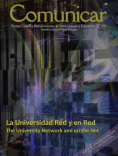
Comunicar
Pioneering research that shapes the future of communication.Comunicar is a prestigious academic journal published by Oxbridge Publishing House, focusing on the fields of Communication, Cultural Studies, and Education. Since its launch in 2002, the journal has operated under an Open Access model, ensuring that research is freely available to a global audience. Based in Spain, Comunicar has established itself as a leading publication, holding a Q1 ranking in 2023 across all its disciplines. It ranks in the top 1% of social sciences journals for Cultural Studies and Communication, and in the top 4% for Education, reflecting its significant impact and reach within these vital areas of study. The journal not only showcases innovative research but also promotes interdisciplinary dialogue, making it an essential resource for scholars, professionals, and students aiming to stay abreast of the latest developments in communication theory and practice.
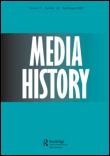
Media History
Charting the Course of Media Through TimeMedia History, published by Routledge Journals, Taylor & Francis Ltd, stands at the forefront of scholarship in the intersection of media, culture, and historical study. With a robust ISSN of 1368-8804 and E-ISSN of 1469-9729, this esteemed journal plays a vital role in advancing research across multiple disciplines, ranking notably in the top quartiles of Communication, Cultural Studies, and History categories as of 2023. Based in the United Kingdom, the journal aims to bridge the gaps between the past and present media narratives, providing researchers, professionals, and students with cutting-edge insights and critical analyses. While Media History does not currently offer open access options, its authoritative content remains crucial for those seeking to deepen their understanding of media evolution and its impact on contemporary society. As a highly respected publication, it serves as an essential resource for anyone interested in exploring how historical contexts shape media practices and perceptions.
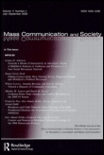
Mass Communication and Society
Innovating Perspectives on Mass Communication and Its EffectsMass Communication and Society is an esteemed journal published by Routledge Journals, Taylor & Francis Ltd, focusing on the dynamic field of communication studies. With its ISSN 1520-5436 and E-ISSN 1532-7825, the journal has established itself as a leading platform for high-quality research since its inception. With a prestigious positioning in the Q1 category of Communication as of 2023, it ranks impressively at #45 out of 511 in Scopus within the social sciences communication sector, boasting a 91st percentile in its field. The journal serves as a vital resource for researchers, professionals, and students interested in emergent issues, theories, and methodologies related to mass communication and its impact on society. Although it does not offer Open Access options, the journal remains committed to advancing scholarly discourse and providing rigorous insights into how communication shapes social dynamics. Since its converged years from 2008 to 2024, Mass Communication and Society continues to push the boundaries of knowledge in a rapidly evolving academic landscape, making it a must-read for anyone invested in the communication discipline.

Revista Mediterranea Comunicacion-Journal of Communication
Fostering Global Discourse in CommunicationRevista Mediterranea Comunicacion - Journal of Communication, published by UNIV ALICANTE, stands as a significant platform for scholars and practitioners in the fields of Communication and Cultural Studies. With an impact factor that firmly places it in Q2 for Communication and Q1 for Cultural Studies, this open-access journal promotes scholarly dialogue through a rich array of articles, encouraging international discourse that spans various cultural and communicative phenomena. Since its inception in 2010, the Revista Mediterranea Comunicacion has made substantial contributions to understanding contemporary communication dynamics, supported by a growing reputation evidenced by its commendable Scopus rankings—144th in Cultural Studies and 181st in Communication. Researchers, professionals, and students are invited to explore and contribute to this journal, further enhancing the understanding of communication within diverse social contexts.

Media & Jornalismo
Navigating the Evolving Landscape of Journalism and Culture.Media & Jornalismo is a leading journal in the fields of Communication and Cultural Studies, published by COIMBRA UNIV PRESS. With its strong commitment to open access since 2015, it serves as an essential platform for researchers, professionals, and students eager to explore contemporary media dynamics, cultural phenomena, and the evolving landscape of journalistic practices. Based in Portugal, this journal boasts a notable ranking in the Scopus database, positioning itself within the 31st and 61st percentiles for Communication and Cultural Studies, respectively. Its rigorous peer-reviewed articles contribute significantly to the academic discourse, making it a vital resource for anyone interested in media research. The journal's convergence from 2018 to 2024 promises to further enrich its content, fostering innovative scholarship in an increasingly interconnected world. Discover more at Media & Jornalismo.
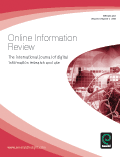
ONLINE INFORMATION REVIEW
Empowering Scholars in the Realm of Information RetrievalONLINE INFORMATION REVIEW, published by Emerald Group Publishing Ltd, is a leading academic journal that focuses on the interdisciplinary areas of information science and technology, engaging extensively with topics related to information retrieval, digital information management, and user interaction with online content. With an impressive impact factor and a significant presence in the Q1 and Q2 categories across Library and Information Sciences and Computer Science Applications, this journal ranks among the top platforms for scholarly research, boasting a Scopus rank of #30 in Library and Information Sciences. Established in the UK, this journal has been pivotal since its inception in 1980, providing invaluable insights into the rapidly evolving landscape of online information systems. The journal offers both subscription and open access options, making its high-quality research accessible to a global audience. Researchers, professionals, and students alike will find this journal a critical resource for advancing knowledge and fostering innovation in the exploration of information technologies and their applications.

Galactica Media-Journal of Media Studies - Galaktika Media-Zhurnal Media Issledovanij
Charting New Territories in Media ResearchGalactica Media-Journal of Media Studies (Galaktika Media-Zhurnal Media Issledovanij) is an emerging open-access journal published by LTD CO SCIENTIFIC INDUSTRIAL ENTERPRISE GENESIS FRONTIER SCIENCE, dedicated to advancing the field of media studies across multiple disciplines. With the E-ISSN 2658-7734 and initiated as an open access platform since 2019, the journal encourages unrestricted dissemination of research findings, fostering collaboration and innovation in media, cultural studies, sociology, and anthropology. The journal's commitment to transparency and accessibility illustrates its role in adapting to contemporary academic standards. Although it currently holds a low Scopus ranking across several social sciences categories, including Cultural Studies and Sociology, this positions it as a growing contributor within the academic landscape of Eastern Europe. Researchers, professionals, and students delving into the intricacies of media theory, cultural dynamics, and societal influences will find Galactica Media to be a vital resource, especially during its converged years from 2023 to 2024, as it strives for heightened visibility and scholarly significance.

Media Literacy and Academic Research
Advancing knowledge at the intersection of media and research.Media Literacy and Academic Research is a pioneering journal devoted to the intersection of media literacy and scholarly inquiry, published by UNIV SS CYRIL & METHODIUS TRNAVA. This journal serves as an essential platform for researchers, educators, and students alike, facilitating the exchange of innovative ideas and research findings in the vital field of media literacy. With an ISSN of 2585-8726 and an E-ISSN of 2585-9188, it aims to promote critical thinking and informed decision-making in the context of rapidly evolving media landscapes. The journal is committed to the principles of open access, broadening the availability of high-quality research to a global audience. By focusing on the educational dimensions of media interaction and its implications for academic research, Media Literacy and Academic Research seeks to empower individuals to engage with media content thoughtfully and critically, ultimately enhancing the academic discourse in this increasingly significant area of study.
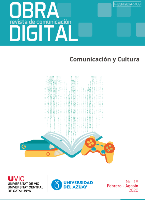
Obra Digital-Revista de Comunicacion
Exploring the frontiers of communication studies.Obra Digital-Revista de Comunicacion is a leading academic journal in the field of communication studies, published by UNIV VIC in Spain. Since its establishment in 2011, it has embraced an Open Access model, ensuring that research outputs are freely available to a global audience, thus fostering greater accessibility and collaboration among scholars. With an ISSN of 2014-5039, the journal aims to provide a pivotal platform for the dissemination of innovative research that addresses contemporary issues in communication theory and practice. The journal’s scope encompasses a wide range of topics, including digital media, interpersonal communication, and cultural studies, making it an essential resource for researchers, professionals, and students alike. Despite the absence of an HIndex and specific ranking metrics, Obra Digital stands out as a valuable forum for critical dialogue and scholarly exploration in the evolving landscape of communication. As the field continues to grow, this journal remains committed to advancing knowledge and fostering academic discourse.